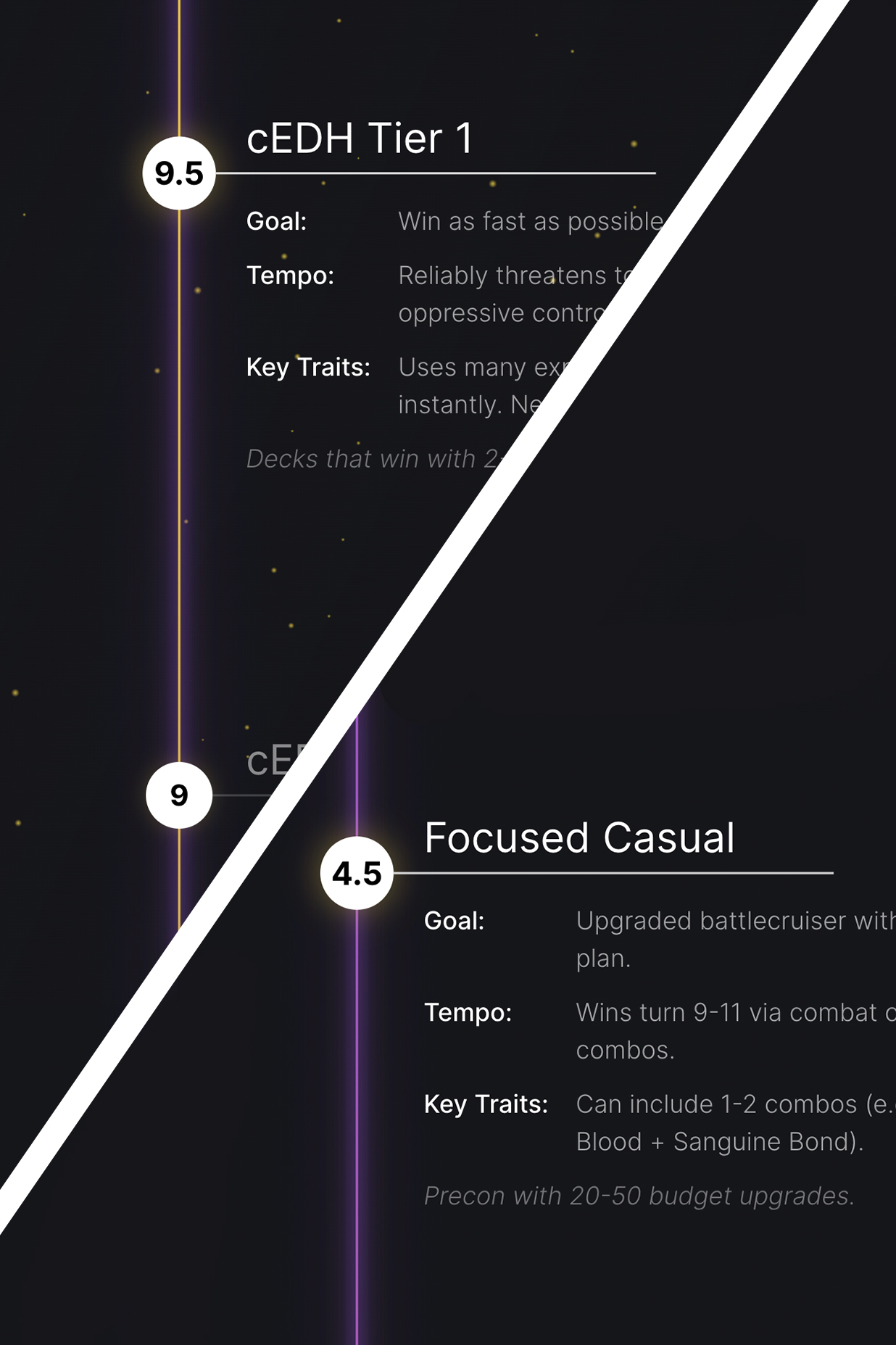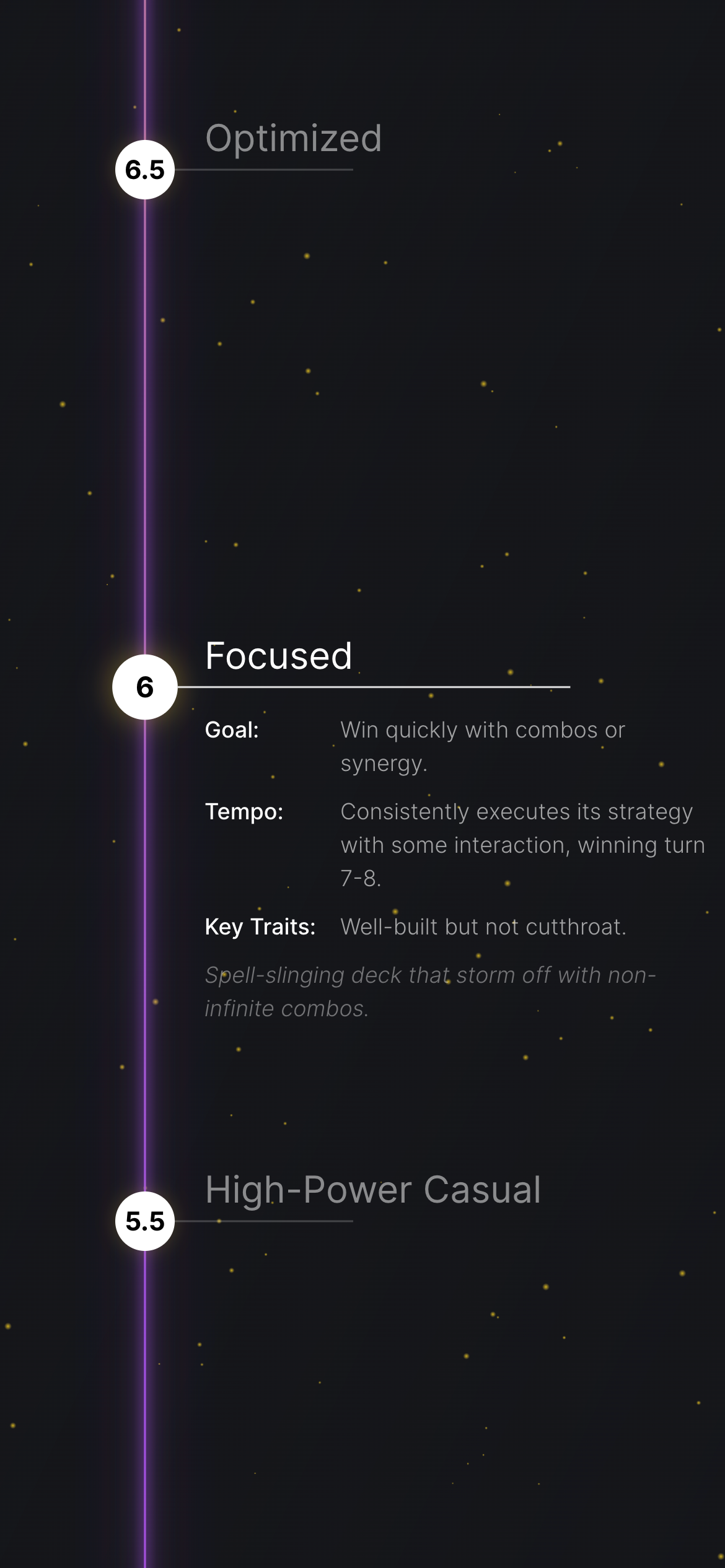
Why DeckCheck Exists
Hi, I am Anthony, the designer-turned-builder behind DeckCheck. I came up through architecture and design, not formal software training, but I have always chased tools that solve real frustrations. Commander nights were supposed to be the place where I could unwind from a busy day but instead, too many games ended with me getting flattened by a surprise turn-five combo after promising a relaxed game. DeckCheck began as my answer to that pattern.
This is the story of how that frustration grew into a platform.
"Pubstomping"
Let's define it right up front, because this is key—and I'll come back to it in a moment. Pubstomping: When someone shows up to a casual game with a deck that's way too optimized or overpowered, whether they meant to or not. It steamrolls everyone else, shatters the relaxed vibe, and leaves bad blood at the table.
My origin story? Nothing flashy. I jumped into Magic during the Innistrad block (2011-2012), fell head over heels, and haven't stopped since. Mostly Modern and Standard at first, until a buddy dragged me into Commander in late 2022—which sent my obsession with MTG to an all-time-high. My close friends wouldn't bite on the game, so I stuck to mostly online play via SpellTable or Untap.in, which brought with it the typical challenges of online matchmaking.
These platforms opened up the world, sure, but oh boy did they highlight a massive pain: pubstomping. At least half my games went south because of it. I'd join a match, we'd chat to "get on the same page," and inevitably, someone lied or downplayed their deck's punch. Thirty to forty-five minutes in, we'd all learn the hard way just how beastly it was. Every single time, I had two crappy choices: Bail out, hunt for a new pod, do the pre-game dance again (hoping everyone's perfectly honest this time), and pray for fun. Or tough it out, scraping for any enjoyment amid the stomp.

Both options sucked. Both options rarely panned out. Both options left me irritated and, worst of all, squandered my limited free time—which was meant to unwind me, not wind me up tighter.
As I kept at it, I vented to other players. Turns out, this was happening to just about everyone. We'd gripe about it and talk about attempted solutions (this was well before the Bracket system too). The go-to advice? Keep a blacklist of known pubstompers, or scrape together a dedicated group where everyone concerned more about having a good time than winning. Neither actually solved a darn thing—they just dodged it. Not my style. I hate letting problems fester like that.
Even before DeckCheck was a spark in my brain, I knew the solution couldn't hinge on good faith alone. Why bet on players accurately describing their decks when we could go objective? Instead of trusting words, let's slap it on a scale: a quick way to signal the playstyle, tempo, and experience you're aiming for. I don’t sit around guessing how long a piece of wood is, I just get out the tape measure. Why can’t I do something like that in Magic? That kicked off my deep dive into power levels. No shock, I found stuff: EDH Power Level, Cards Realm, Commandersalt—all trying to tackle it in their own ways. Solid efforts, but they missed the mark for me. Not wrong, exactly, just not rooted in the hard criteria I was looking for. None felt objective enough to satisfy.
Then, I stumbled upon an image of a power scale based on turns (see image below). No clue who made it or when, but it was straightforward: Rate a deck by the turn it can win on.
Duh.
Magic's turn-based, right? Pubstomping was never just about losing—it was getting blindsided by the timing. An expectations mismatch. Like, if we're all rocking precons, we know turn 3 wins aren't happening. Those decks aren't built for it. We're geared for longer games, so a turn 9 victory? No surprise, no salt (unless you're a sore loser type). In theory, if I could slot every deck accurately on this scale, mismatches would evaporate. Find folks with decks tuned for similar win turns, and boom: shared power, shared tempo, shared expectations. No sneaky turn 5 bombs. No more pubstomping. Now, I just need a way to measure everyones deck at scale.
What breaks
When expectation and reality diverge, the table gets salty, time is wasted, and players feel betrayed.
What fixes it
A simple way to understand the kind of game about to take place and tooling that respects casual players as much as grinders.

Measuring Power
With a scale found, the next step was converting decklists into ratings. Manual evaluation, as done by some services out there, seemed too resource-heavy.
But around then, AI was exploding. To skip the detail and mostly inconsequencial backstory, I'm a tech nut. I'm always interested in the bleeding edge. I'd been messing with LLMs since ChatGPT 3 dropped and, while power levels swirled in my head, Claude 3 Opus launched—the new top dog for reasoning at the time. Like everyone, I hurled all sorts at it to test the hype. In the mix: My trusty Gishath, Sun’s Avatar deck. I fed it the scale, the list, and asked: "What power level is this, per the scale?" The correct answer was a 6.
Its answer: 6.
Then, I tried a few more familiar decks and it nailed them too. This sparked the idea: Could AI handle ratings at scale?
Only one way to find out.
Building DeckCheck
To test it, I built a simple little website, flipped the switch, and shared it on the big Magic subreddits. Folks tested it hard and feedback flooded in. Mostly gripes about AI flubs on many decks, but sprinkled in were the wins and I knew right then I was onto something. All that remained: Double down, toss it into the fire, and see if it survives.
The early months were all about refining the ratings and the power scale scale they were based upon. Both needed work. It became clear that certain types of decks would be much harder to measure than others. For example, "Stax" decks have their own uniquie way of winning: Lock your opponents out of the game early and win on some turn thereafter. This was one of many challenges both the AI model and the power scale had to account for. So, I refined both the AI and the power scale a lot in those early days. Community input from experienced players was invaluable during this time. Discussions on factors like power ratings in isolation versus with interaction, the role of jank tiers (1-3.5), and the undeniable characteristics of each level were instrumental to creating a robust solution.
Those convos shaped the scale into what it is today: Clear, definitive, objective, and Commander-specific.
And yeah, during this time, players from all stripes piled on about how the AI botched their decks.
Perfect. Fuel for the fire.
I'd tweak based on their input until the "wrongs" turned "rights" (or at least 90% right seeing as perfection is more of an ideal than a practical reality). Who knows how many iterations like this I’ve done. 1,000+ easy. But now, it’s rare to hear of total misses. DeckCheck was forged by players, for players.

A Solution That Works
So, to the big question: Why buy into DeckCheck's ratings? Buy into them because it endured a brutal trial by community fire and came out the other side. And hey, proof's in the pudding. If it didn’t work, nobody would have used it, growth would haved stalled, and I'd have canned it ages ago.
But they all saw what I saw: Potential. And so I kept at it.
Now, DeckCheck's grown into way more than a power calculator. Now it's a Commander-centric deck-building platform. Upload your decks and dive into a solid builder suite. The baked-in AI tools provide focused feedback you can’t always get on the forums: Mana Tune adjusts land bases to prevent stalls, Power Tune recommends changes to shift power levels, and Deck Trim suggests cuts for oversized decks. These features analyze decks methodically, offering additions or removals with rationale. On top of all of that, the deck builder incorporates Scryfall's tagger for smart (non-AI) recommendations and Smart Search, which converts natural-language descriptions (e.g., "green ramp that draws cards") into precise queries, easing the learning curve.
Core features include collection management, tagging, and bulk operations, streamlining deck refinement without begging for forum feedback.
Beyond building, DeckCheck flips deck searching on its head. Every analyzed deck receives a detailed breakdown—power, stats, combos, strategy, playstyle, and insights—making searches intuitive. Unlike other sites with inconsistent descriptions, DeckCheck standardizes data so you can quickly understand what you’re looking at.
All of this while staying true to the players's needs. DeckCheck is built by a Commander player who gets the headaches firsthand so I really focus on solutions that feel natural and don’t rely on you understanding buzzwords. Also, and most importantly, it's free to use (with options for those power users out there).
Since launch, DeckCheck has grown to 45,000 monthly active users, more than 500,000 decks analyzed, and a focused Discord community approaching 400 members. There’s a constant stream of "this site is amazing" and "it’s core to my MTG flow" Anecdotal, sure. But it’s real proof that the idea is worthwhile.
I wanted to mention that the current scope of DeckCheck is Commander-only; support for constructed formats is possible but not prioritized, as they face different challenges that I’m not sure a site like mine can solve. We shall see.
The Vision
I'm an idealist at heart and I believe with all my heart that we inhabit a world where bold ideas deserve chase. And ideas? They evolve. DeckCheck's no different.
It kicked off as my Type A self tackling pubstomping through universal ratings, and user reports suggest it's effective for those who adopt it. Now, the focus has shifted to encouraging broader use, without forgetting there’s always room for improvement.
More importantly, the broader vision: DeckCheck as a dependable resource for Magic essentials, like an expert friend. I’m not out to replicate every feature from the big tools/sites out there and build some sort of omni-tool. The plan is to keep this focused and solution-driven.
DeckCheck's targeting prolific issues with broad solutions: Intuitive deck-building guidance, improved card discovery, and resources to enhance accessibility. It's geared toward average players, especially newcomers and casuals, who often feel underserved. They benefit from detailed, patient, and complete support—without frustration and on their schedule. These players are the ones who suffer the most from pubstomping, inefficient spending, and avoidable errors.
Importantly, this isn't zero-sum game. Unique player preferences mean no single tool fits all; collaboration enriches the experience. Gatekeeping undermines the community's spirit—if it stems from fear of change, it's counterproductive.
If this narrative resonates—perhaps echoing your own experiences—explore DeckCheck, join the Discord, or connect on socials (@anthograham almost everywhere). Together, we can foster a more equitable and enjoyable Magic community and help our beloved game thrive.

Community Discussion
Loading comments…